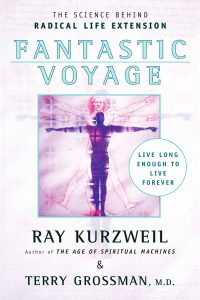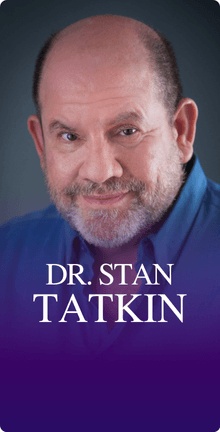Welcome, Christine, thank you for joining us today.
It’s great to be here, Stephan, it is always a joy to chat with you.
Likewise. So let’s start with – give a little background on nanotechnology and what the future holds. Many people don’t understand what nanotechnology is and you might hear nanotech as a term being thrown around like for a pair of pants but the future is much bigger in terms of nanotechnology is much bigger than a pair of nanotech pants that repel wine stains and things like that. Let’s start there.
Nanotechnology will develop over time just like any technology.
Sure, that’s right. And it is perfectly natural to be a bit confused about the term nanotechnology because it is used in so many different ways. I think for most of us the simplest way to think of it is nanotechnology will develop over time just like any technology. It started in the area of materials, better materials, that would include pants that repel stains, and that is great. That is fine. The next stage we are moving to now is devices – devices that operate down at the nanoscale and then the most exciting time frame to me will be the third stage, when you actually get systems operating down at the molecular scale. Systems of machines that operate at atomic precision. Now, in terms of the interest of this audience, I think that stage will be the most exciting one.
Right, so – kind of the brave new world in terms of human experience might be things like utility fog and having our entire blood replaced by synthetic fluid and all sorts of stuff. But what do you see happening in the next 10 or 15 years? Feel free to extend beyond that all the way to the singularity.
That’s a big question, but let’s take it on. In terms of 10 years, or what the listeners might see in their own lives, we are still looking primarily at materials or very primitive devices. What we are doing right now is interesting applications in that time frame is in the industry of health. For example, most of us in our families and among our friends have seen real tragedies from things like cancer, it is everywhere, we have all been touched by it one way or another, and it is a tough thing to deal with. Basically, they hit it with radiation, they cut it out with surgery, and one thing they try hard to do is hit it with chemicals. These chemicals they dump into the body are not well-targeted, and also effects healthy cells as well as cancer cells.
Using these early nanomaterials, they are doing much better at detecting cancer early, imaging it more clearly, and most exciting to go in and treat it in a very targeted fashion. The cells that are being attacked are much more cancer cells rather than normal cells. For people in your generation, my generation, and younger, there’s certainly a hope that although cancer doesn’t disappear, it becomes much more of a treatable thing, something that you tend to survive rather than the death sentence it used to be. We’ve made great progress on that, but we have a long way to go. That’s very exciting in terms of health. Wouldn’t it be quite a blessing for the word cancer to be not as scary as it is today? So, that is coming. That’s very mainstream research. I think it is starting to go into clinical trials, so I think we should be seeing that in the earlier timeframe you mentioned. That’s pretty exciting to me.
There’s certainly a hope that although cancer doesn’t disappear, it becomes much more of a treatable thing, something that you tend to survive rather than the death sentence it used to be.Christine Peterson
Right so, what about in the kind of far future, let’s say 30 years into the future. For those listeners who don’t know what singularity is, could you define that? And then, could you describe what that future could hold for us?
Let’s tease that question apart into 2 questions. First, let’s talk about what nanotechnology might look like in 30 years or beyond that. Obviously, if you look in the longterm future, you have to start saying “Alright, what do the laws of science and the laws of physics permit to be built?” and in other words, “What if we will be able to use molecular machines to build with atomic precision, whatever we want?” and that includes in the human body. That’s a huge question, and the answers are very broad. Just to take one example out of thousands that you could imagine on the health side. Let’s say for sure we should be able to go in and repair DNA. Now, think of all the huge health consequences DNA mutations cause. What if we could go in and even on a cell-by-cell basis, which is extraordinarily challenging today, but if you go far enough in the future through the use of molecular machines, one can imagine a future where we send in these molecular machines systems, you analyze enough cells, you’re able to compute and analyze what should this DNA look like? And you just put it back the way it should be. The revolutionary consequences of that for health are profound. You’d also be able to get rid of congenital defects.
Basically, without having to do germline genetic engineering, which a lot of people are nervous about. You say, we’re not going to mess with the germline, we’re just going to do repairs if they are needed. Once the individual is born. So from a health perspective, it is just stunning. And then to take that another step further, you say, alright, let’s not just repair DNA, let’s repair the other things that go wrong. Like cross-linked proteins, the plaques of Alzheimer’s, cataracts, you name it. Whatever illness or disease in the body, these are the result of molecules out of place. There is some physical problem that in principle, if you give it enough time and enough computational power, and the right tools down at the molecular level, we could repair it. So, what does that leave in terms of illnesses or diseases that couldn’t be fixed? Well, nothing! Nothing at all. Unless I suppose if a truck runs over your head, you’ve lost information, there’s no way to put it back, but in terms of more traditional illnesses or diseases, including aging, but at the time you have these extraordinarily ambitious technologies they just are treatable. So then we are looking at pretty extreme longevity. There are things that say if humans could live long enough that only accidents cause a problem, it’s about 10,000 years, which is a very respectable time frame. And given that amount of time, we could conceivably get good enough to record the molecular structure of the brain to the extent that we could rebuild it. In which case then you could record the structure of the brain to the point where, in essence, you have a backup copy. So in essence, even the 10,000-year limit goes away. So these are obviously extraordinarily theoretical, very long-term capabilities. But if the only constraint is the laws of physics in the long term, these are the things you come up with.

Yeah, pretty mindblowing. So what is the singularity, for those listeners who don’t understand or know that term?
It turns out there is a number of definitions for that term, so I’ll just pick the one I like. The one that perhaps is the most common or that I’ve seen the most, which is looking ahead to the time when artificial intelligence technologies reach the level beyond a human being and trying to predict what does the world look like after that point – it becomes extremely difficult. There are some things we can try to say about that, but the term singularity implies that looking beyond that point becomes difficult. If there are entities in the world that are extremely intelligent that are not human, those entities are going to start having a huge influence on what our world looks like, and it’s not a world, really, that we’ve seen before in history ever. So it’s a very challenging time frame to think about.
It’s hard to predict, that’s kind of the nature of the singularity, is known laws of the universe in that regard break down. A quantum singularity, a black hole, the regular laws of physics break down. When we are talking about an evolutionary singularity, such as artificial intelligence or I guess autonomous intelligence, the artificiality isn’t necessarily at that point, would surpass human intelligence. That is going to be very unpredictable in terms of what the world might look like.
That’s right. We can speculate, and there are folks out there that are actually trying to work on this problem and saying “alright are there negative outcomes that we can try to imagine?” Is there anything we can imagine we can try to do today that could reduce the chance of that happening? I’m involved in one of these groups, the Machine Intelligence Research Institute. There are some others, the Future of Humanity Institute, the Future of Life Institute, who are looking at these issues saying “Hmm, this is a difficult thing to think about”, but if one does think about it, it is certainly something we can – I won’t say perhaps that it is inevitable, some say it isn’t inevitable, but to me, it feels pretty darn inevitable. The naysayers, sometimes you find naysayers that say “Well, it is going to be 200-300 years out”.
Personally, I find these arguments very unpersuasive. They seem to be just emotional reactions to me, so to me, I see no reason why this couldn’t happen much much sooner, conceivably even in our lifetimes. And if so, that is certainly is something we need to look at. Not everybody needs to spend a lot of time on it, but we do need to decide in general to at least some effort into looking at it. That is why I’m an advisor to MIRI. Their website is intelligence.org, and I recommend everyone take a look at that.
If there are entities in the world that are extremely intelligent that are not human, those entities are going to start having a huge influence on what our world looks likeChristine Peterson
Because if we just kind of evolve on its own without having any kind of controls or guidelines, we could end up in a very bad kind of place. If nanotechnology were to advance without any kind of ethical controls, we could end up with the grey goo problem or something like that, maybe you could define for our listeners the grey goo problem.
Early on in thinking about nanotechnology – very early, I’d say the late 70s, early 80s – there was a concern that systems of molecular machines, if they were to get out of control, could focus on rebuilding the physical world around us, taking those things about, building those things into, for example, copies of cells. And certainly, we see this in living systems. Consumption and reproduction. It is a reasonable thing to think about. Since then I think the concerns in terms of “what are the downsides of nanotechnology?” are past that early thinking, and toward the more, I would say the more interesting question of “how would it be abused deliberately rather than an accidental scenario?”. If you look at the technology of the past, that’s where the real problems come in. I’d say the grey goo scenario was an interesting experiment, and I’m not saying it is impossible, it is just that I think concerns have moved on to even more distressing scenarios regarding potential downsides of nanotechnology.
Right, so nefarious uses of nanotechnology – instead of bioweapons, nano-weapons.
That’s right, and the downside scenarios are pretty similar in some ways to bioweapons and chemical weapons. So today’s efforts to control bioweapons and chemical weapons are to an extent very successful are very useful models of how we should think about controlling nanotechnology in the future.
So let’s jump back to the medical advances for a bit – Alzheimer’s. For what I’m seeing, it’s becoming epidemic, Alzheimer’s and so is autism. I don’t know what the environmental factors are that are causing this, but I’m pretty certain that it is some environmental toxin that is causing a huge uptick in autism and Alzheimer’s. What are some of the more promising futures for these diseases that you have heard?
You know I can’t say that I track – first of I agree with you that these are huge huge issues. Of what is causing the increase, I’m not 100% sure. I think your theory of environmental toxins is an interesting one, and I’ve seen other ones that are also worth pursuing. These are so complex. I haven’t really seen – in terms of nanotechnology therapies – I haven’t seen that much. There have been really interesting work in both areas, I know they just hit the news about being able to go after Alzheimer’s using ultrasound, which would be absolutely wonderful. They are claiming dramatic results. So I think there are interesting things coming. I don’t think they are coming from nanotechnology per se right now.
If you are interested in longevity, to take control.
Okay. Speaking of environmental toxins and stressors, and this isn’t really a nanotech question but a chemistry, physics, biology sort of question. How serious do you see the environmental stressors and what are some things we can do to minimize our exposure to toxins? There’s been a big documentary that just came out from Bulletproof, Dave Asprey, actually just saw it, pretty interesting, on black mold and its effects. What do you think are the biggest worries we should be cognizant of, and what are the solutions as far as mitigating the exposure and the effects.
That’s a great question. I do follow Dave Asprey’s posts and his work. In terms of mold, I think Dave is onto something, I’m not really familiar with black mold itself, but something Dave does talk about is mold in our food supply and it is interesting. We all know that processed food is a problem. We know that the more you can eat whole foods that you have bought either in raw form yourself if possible, not even cut up, and you bring that home and do it all yourself, we all know the more you do that the better But the question is why that is. We know in part 1 is that the nutrients in the food become oxidized the more that it is processed. So the more processed the food is from heat and exposure to air you are losing nutrients. However, Dave makes the point, and I think he is right, that the more processed food is the more likely it is to have mold in it, the mold toxins. So why do I think he is right about that? He can give you lots of reasons, but I’ll give you a very simple one on my own.
Years ago, before I became more food aware as I am now, I used to eat a lot of popcorn. I would buy Orville Redenbacher popcorn which is about the highest end popcorn you can get. It is very expensive for popcorn, but I wanted the best you could get, so I got these bottles of it. And I noticed that if you actually look at the kernels, there is a lot of them that have a black spot right where the kernel separates from the cob, and I thought, that is odd. And I notice sometimes it would taste bad. So I would pull those out and waited a few days, and the black spot got bigger, and the black spot turned red. So this stuff that is on these kernels, this is not dirt, this is something growing, a mold or a fungus. When Dave says that the food is moldy, here you’ve got the highest end grain you can buy, you can actually see something on it, I don’t know if it is a mold or a fungus, but you can see it growing on it. If you think about processed food, how much more likely is it that the food that is processed where you grind it up and can’t see it, how much of it might be moldy?
I think his point is a great one, which is if you are in the food service world, whether you are a farmer or wherever you are in the chain, if you have a piece of food that has mold on it and you don’t want to throw it out, just grind it up, right? Nobody will know unless it is tested. You can get the same amount of money for it if it wasn’t moldy. Unless we start testing as Dave does, for example, I think he tests his coffee beans, you have no idea what is in there. So, I think there are real concerns about the food supply and those of us who are able to do so there is a huge incentive, if you are interested in longevity, to take control. And go through the trouble, and it is a lot of trouble, to go home, buy raw food, and process it yourself. You can make a hobby out of it, and certainly, you’re going to have much better quality food, and it tastes better too of course. I have a garden in the back, and we have more blueberries than we can eat, and it is wonderful. It is a lot of work, but once you start eating food that is really fresh, it is hard to go back. It is like an order of magnitude better. In terms of just taste.
The more processed the food is from heat and exposure to air, the more likely it is to have mold in it, and the mold toxins. Share on XWell, I think that is pretty remarkable that you would notice the popcorn kernels, pick them out, separate them, and see what would happen to them. That just really accentuates how much of an inquisitive mind you have, and our listeners, I would say, really need to become inquisitive in that same way. Become scientists of their exposure to environmental stimuli, factors, toxins, stressors, etc. And just in general, become more aware of the world around them.
That’s right. And I just mentioned that there is a name for this movement, called the quantified Self Movement. And in fact, there are conferences coming up in about a week and a half in the bay area, and I’ll be there. So anyone who is really interested in health, longevity, measuring things, finding issues in the environment, exercise, you name it, right? Anything affecting your health. Highly recommend The Quantified Self conference. I’ll certainly be there, and I think I have been to I think everyone they have in the United States. I think they are excellent.
I haven’t been to that one. I’ve heard of the Quantified Self movement and the many devices out there that help. For example, the Apple watch. I’ve heard of FitBit, a lot of really cool devices that will give you feedback. For a while, I was wearing a sleep monitor on my forehead. Physio, they stopped making them, unfortunately, but what a cool device, could tell you how much deep sleep you got the night before and so forth. Who was it? I can’t remember who said this, but “What gets measured gets managed”. I’m a big fan of quantifying as much as you can. The Quantifying Self Conference, what about BulletProof, Dave Asprey’s event, have you been to that one?
I have not. I don’t think he’s had one in the Bay Area and I’m a little lazy about leaving here because I know if I just stay here eventually it will come here. I know it is lazy of me. I think Dave’s conferences are very interesting, and I know of course we are all interested in improving our bodies so, I would definitely – I believe a lot of those conferences are available on video now, if it is hard for you to get where he is having it.
How would you define biohacking? Because that is probably a term that many folks have not heard of before.
Well hacking as we know is making a change, taking an engineering approach to whatever a system is and then bio indicates our bodies. Taking an engineering approach to making changes and improvements to our body. There are many traditional ways like dieting, and exercise, hacking your sleep is another super important one, stress reduction super important. Then there is the more exotic stuff, working on brain chemistry, supplements to improve your brain chemistry, so there is just a huge variety of things you can improve, whether it is the performance of your body and its longevity or your improvement to your brain function.
I think that supplements are mostly useful if you are trying to fix a problem in your biochemistry that is nonstandard.
Right, so you mentioned there are supplements to improve brain function and so forth. What kind of supplements to take? Feel free to not answer that question.
That’s fine. I take a ton of supplements. I used to advocate supplements as the first longevity step that people should take because they are so easy to do, you just pop a pill in your mouth. What could be easier? Since then my views have evolved. Yeah, popping the pills is easy. Figuring out what supplements to take is really hard. So, now that is not my first step anymore. I think that supplements are mostly useful if you are trying to fix a problem in your biochemistry that is nonstandard. In that case, you can take a quantified self approach, you can order your own blood test, people don’t know that. You think you need your doctor to get a blood test. That is not true. You can get a blood test online. You can order them and take it to your local blood draw place and hand it in and they’ll just take your blood for you and you get the results yourself. Many people have doctors who are not helpful, they think you can only get tests the insurance company is going to cover, that is not the case. We are legally allowed. There is some health freedom in this country. You can order your own test. I think supplements are useful if you can see a clear reason, some deficiency that you need to deal with.
In terms of supplements that improve your brain function or lead to longevity, those are much harder to come by. The one that I am most interested in, I haven’t started this one yet but I’m meaning to look into it, is depernil, for longevity. Some longevity experts that I respect are taking this and recommend it, and I think they are right. I should, when I get around to it I am going to get going on that one. In terms of brain function, one site to look at would be examine.com. They survey the literature for a wide variety of supplements. They originally got interested in supplements for improving your physical body or muscles, but now they look at all kinds of things. They take a pretty strict stance on the literature. They serve the literature and study the literature. If they recommend a supplement they have pretty high standards or harsh standards, they have a pretty high bar. So if you are new to supplements or don’t really know what you are doing, going to examine.com and looking to see what they are recommending is a reasonable thing to do. For the more adventurous, if you’re out on the edge a little more and have some background and want to judge a little extent, you can go to the life extension foundation. If you do go out on the edge like this, you can actually do some damage. It is something to be conservative about unless you do really know what you are doing and you’ve really found an advisor who you trust. Definitely worth looking into, but not an easy area.
Gotta do a lot of research. One product that sounded interesting to me, I haven’t done my due diligence yet, but the founder of this smart drug I guess was a speaker at an event I was just at. The product was called Accelerol, have you heard of that one?
No, but I’ll just give everybody the procedure to use, like let’s say your friend, like Stephan, mentions a product. Okay, that’s great. In this case, the name is – okay that is a trademark name, it is probably a private company selling this and that is fine. What you have to do first is find out what’s in the product by its chemical name, it is usually a mix of things. Then you have to look up all of those and say “okay, exactly how much of it, what is the chemical, how much am I getting of it per day”, then you go to a website you trust, somewhere perhaps like examine.com and say “What is the effect?” “Is there any data available on this?”. So, anytime you hear about a new product that is just the protocol you have to take. From the name, you can’t assume anything about it. I haven’t heard of this one, there are a lot of them out there. But the procedure is always the same.
Usually, what you find, I can’t speak to that one, but usually what you find is an interesting mix of compounds which is most cases are generic compounds, so you could buy them separately, there is one advantage to buying them separately, and that is if you want to change the ratio. If you buy it in mixed form, the ratio is set by the product, you can’t change it. They bundle it. If the ratio is 2:3:1 for compounds, you can’t change that. If you buy them as separate products, you mix them and you can do that. On the other hand, it is much easier to buy them as a mixture. So if you like the ratio, there is no reason not to buy them as a mix. You just look at the prices. Is it cheaper to buy it unbundled? Is it cheaper to buy it as a mix? The more you trust the company, the more you want to buy their mix. As more research comes out, hopefully, they will be tweaking the product, if they find the ratio could be improved, hopefully, they will do that, and when you start to trust certain companies you are going to want to stay with those products because, hopefully, they keep improving them.

One thing we didn’t really discuss yet is sleep hacking. What do you recommend, or what do you do yourself for sleep hacking?
I’ve tried a lot of different things. This is a tough one. First of all, it is super critical to work on your sleep. If you are not having good sleep, that is going to mess everything up. Those are the hours your body does its repairs, so if you have bad sleep your body is aging faster. It is going to increase your odds of all kinds of diseases if you don’t fix that problem. Super important, and possibly at the top. I know I said supplements were a good place to start, boy, if your sleep is bad I would almost say if your sleep is bad then that is the place to start. There are a lot of things that can go wrong, so many basic things to do, you can find lists of those on the interest. There are also difficult things that can mess up your sleep, such as hormone levels. You can get those tested. I mentioned blood tests, you can also order urine tests, which I think is perhaps a better way to test your hormones often. You can get saliva tests from Cortisol. You want to do it at least 4 times in one day, that is every six hours or so. That’s really critical if your cortisol levels- many of us have messed up cortisol levels. You can’t just do it once per day and you can’t just do a blood test. Many physicians don’t get this right. You have to take control yourself. Either find a physician who will order the 4 times/day saliva test or do it yourself. I think that can be done. Get the results and study it. You can find the results right on the internet. How should this look? If your hormone levels are off, that is going to screw up your sleep. And probably you’re going to want to work with a physician. How do you find a good physician? This is a challenge. A lot of more informed physicians in this area use the term “functional medicine”, so “functional medicine” physician. Some use the term “integrated physician” or “integrated medicine”. Or if you have longevity-oriented friends, or friends into the biohacking or quantified self-movement, ask them who they go to. If you have serious problems and really want to deal with them, you have need to go to a physician out of your area. A lot of them like Terri Grossman, are well-known. If you really get serious and you have a big problem and have to solve it. Sleep is a big issue. I wear this Fitbit flex, but the problem is, all it does is track movement, so if you lie still, it thinks you are sleeping, so it really is not useful for sleep tracking. The Zeo we mentioned earlier is a much better sleep tracker, which I’ve heard you can still get on eBay for $200, which is not that different from what it was sold for originally when they were still making them. Much higher quality sleep tracking. It’s a huge topic and an important topic and we could do several shows just on that.
You’re right about that. You mentioned Dr. Terri Grossman, really cool guy, I had the pleasure of attending one of his sessions, not really a workshop, but a conference session. What was that event that Foresight Institute co-produced with some other organizations? Oh, Convergence, love that event. So Terri Grossman spoke at that. That was my first exposure to him. He is the co-author of Fantastic Voyage, he partnered up with Ray Kurzweil on kind of life extension and health-oriented biohacks. Is that a book that you recommend people read or should they go to another resource? What sort of resources do you recommend?
I think as a place to start, it’s a good place to start. It is not a new book at this point. I think rather than jump in and start implementing the recommendations, look at the date on it and realize that in this field information changes fast, realize that this is a good place to start. Before you start popping pills you have to do the homework, there may be new information. It’s not a bad beginning place. If people need to start, it is a decent place to start.
And are there any other online resources that would be important for folks to check out?

I mentioned a couple. Examine.com, the Life Extension Foundation, which is really at this point more of a for-profit, but they have a bunch of resources. That is pretty edgy, I’m not recommending it as a base, but a basis to get ideas of where to research. There is also the Life Enhancement website is pretty interesting. And then for buying things, you can go to International Anti-aging systems, that is outside the US, sometimes you do have to go outside of the US to get the things you want to buy.
And Aubrey Degray doesn’t have a website?
Aubrey Degray does have a great website, but it is research-oriented, it is for people who want things to do right now for their own bodies. It is probably not the best place to start. If you want to get involved in supporting research for longevity, which I highly recommend, it’s a great website. I believe it is sens.org, Strategies for Engineering Negligible Senescence. And they have a great conference coming up in August, which I will be at. The early bird rate for that ends June 15th, so five days from now. That rate goes up. It is in the bay area, I think in mid-August. This is just the second one in the series called Rejuvenation Biotechnology. I went to the first one which was last year, it was excellent. It was a research conference, but people who want the latest information and are technical enough to follow the research stuff, it is absolutely fascinating for those interested in longevity.
Yeah. Cool. And, as far as preparing for the brave new world that is going to be coming and let’s say you don’t have that many years left – Alcor is an option many people are looking at, could you describe Alcor for those who haven’t heard of that?
If you’re interested in longevity, but you’re thinking, this sounds great, if it were 50 years from now I might get a lot more time, but as it is I’m not sure I’m going to make it. I’m not sure these technologies are going to come online in time for me. We would all love it if there were some way to travel forward in time and take advantage of things like that. That leaves for the question – is it possible to do some sort of suspended animation? Is there some way to take a human body that is aging, perhaps has a disease and basically keep it as is for decades or longer, however long it takes, until science catches up and is able to repair it. That’s the concept of suspended animation. In the early days of this concept, what they would try to do is take the temperature down, bring in this human being and hope that will do the job. So that was the early days of cryonics.
As time passed, they got better technologies, they would use basically a form of antifreeze to reduce the problems of freezing. That’s good, but it also causes significant damage to the person. Not an easily reversible process. More recently, the technologies have improved even more and there is improvements that I know are happening in the lab that they have tested on organs where they are reversible. Basically, anyone that is interested in longevity but is concerned that science and technology is not moving fast enough – you can make plans with these cryonics companies, the biggest one is ALCOR, for life extension. Their website is alcor.org. They are on the cutting edge of these technologies and they will do their best for you to try to take whatever the best-suspended animation technology whenever it is you need it and implement that for you. And I currently have signed up for this, I don’t really see a downside, so it is worth a shot. And I definitely think it is something to look into.

So that is cryonics. What about cryotherapy? Because that is something that is just recently suggested to me as a way to extend our telomeres, because as we age, our telomeres shorten, and that actually could be part of the reason why we are aging or the way we experience aging is because of our telomeres shortening.
You know I have not seen the data on that. I think it is interesting. I know one person who is doing it, so I’ve seen a lot of discussion of it in the longevity community. That is not a good sign, but it could just be early days. I personally have not followed it long enough to know whether that is a good idea or not. It is an interesting idea, relatively straightforward, not something I can comment on, but worth looking into. It is commercially available. I know it can be done today.
For those who haven’t heard of cryotherapy, it is a machine you step into that is very cold, several hundred degrees below zero or something.
I hope not. I hope it is not that cold. Very cold. You don’t want to be in too long.
For sure. Some people that I have talked to in the biohacking community say that this is good stuff. I haven’t tried it myself, I don’t like the cold, so I am not in a huge hurry to try it, but I might someday. But, now let’s talk about hacking your love life. What sort of technologies and thoughts, what kind of paradigms do you have for hacking your love life?
Well, Stephan, I’m actually working on a book on this now. The title is Finding Love and a Life Partner, the subtitle might be “using science and technology”. And I’ve given talks on this. Basically, if you look at the numbers, for those of us who are into longevity, one of the biggest factors is our personal relationships. For those of us who are happy on their own, that is great. But most of us do better healthwise if we have some kind of life partner. It should be someone we are very close to, is supportive, and we are social animals, right? So it is natural that our health benefits from this, and our longevity benefits. What happened is that I went through the process a few years back about finding a new life partner, and I learned a lot of lessons from this. Most of them if you think about it, what is this process of human bonding to a romantic partner? It is a chemical process. You have two animals, two animal bodies, we have our frontal cortex stuck onto basically what is an animal body, and these hormonal processes, or chemical processes that happen in the body.

When you are looking for a new partner, basically you are trying to get these chemical processes to occur. It is important to figure out, alright, what are these chemicals involved? Do you want the chemicals to go up and down? How do you make that happen? So I looked into that, and it turns out there are things you can do to try to manipulate these chemicals to get them to do what you want to do. It is very indirect, we have no direct access to these things. But there are some things that work better than others. That is what I am trying to do when I finish this book, which could be quite a while. Until then, there is a video on YouTube, look up Christine Peterson and then type “love” because I have a number of talks on these subjects and you don’t want the others. So it is my name and love, and it’ll pop right to the top. You can just watch the video and get a lot of content that will be in the book. So, I think that people today, a lot of people, are doing things that do not work well with the desired process. They are not doing things that trigger the hormones to rise or decline the way we want them to do. Pretty speculative stuff, the stuff that I am speaking on and in these books, but I also think this is pretty intriguing and also it fits with our evolutionary history. If you look back and say “Alright, what does human mating look like in the past, and are we really that different today?” We are not really that different today. If you look back a 100, 200 years, our bodies are not that different. So whatever went on back then needs to be the same stuff that happens today if we want to form those tight bonds.
Cool, so I just want to circle back. We are going to wrap up now, because this has been like drinking from a firehose for the past 50 minutes or so. It has been great stuff. I want to look at this in a mathematical way. In the last 100 years, this is according to Ray Carswell, in the last 100 years of technology and improvements and advances have not stayed at a steady rate. They’ve increased and accelerated. The Law of accelerated change. At today’s rate of change, it is happening a lot faster than it did 100 years ago. The last 100 years would fit in the next 20 years at today’s rate of change. But then because it is continuing to speed up, it would actually fit in the next 12 years, not in the next 20, because we are going to not stay at today’s rate of change over the next 20 years. This is something given by Ray Carswell sometime in the last decade, so the numbers are probably all wrong now. What are your thoughts about the law of accelerating change and how quickly things are going to advance? Things like medical triquarters, stuff you might see on star trek, could very well be in our homes in short order. Maybe we could sum up the podcast with thoughts on that.
Yeah, it’s true. Ray Carswell, he advocates the model of exponential change, and certainly, you can point at a lot of examples of that. On the other side, you have Peter Thiel, who points out some areas we seem to be having a slowing of technological change, and he points at regulatory issues, problems in funding of science and technical science. Issues in the idea of where venture capital is going. And I think Peter has a point. So I think you have to look at both sides of these issues. If we could throw the amount of money we would like to at science, and also you’re going to have a lot of regulatory barriers, you could definitely see exponential change in those areas. But then in areas such as medicine, how super regulated it is in this point. A lot of things that I’d like to tell your listeners about, it is not easy to get because of these huge institutional barriers. Or even legal barriers. In some cases, I’d like to recommend ways that are not legal. So while I agree with Ray that in principle and in some areas we are seeing exponential change, I also have to agree with Peter on the other side, in some places we’d like to see exponential change, such as medicine, we may not be seeing that. So it really depends on the specific area. If you look at electronics, yes, we see it. If you look at software, yes, we see it in some areas. But perhaps not in every area. I would love to see exponential change in some areas, I’m just not really sure we are seeing it.
Got it. Okay. This has been really illuminating. I’m excited to have you back sometime in the future because we only scratched the surface. There’s so much more that we could be talking about in terms of future tech, and nanotechnology and life extension and so forth. So, again, thank you, this was awesome, and we’ll see you hopefully in another episode.
Absolutely, this was a blast, and I look forward to next time.
And thank you, listeners. Any questions, any links you wanted to follow would be in the shownotes, and there will be a transcript of this entire episode. Catch you next time.
Important Links
Connect with Christine Peterson
Organizations/Companies
People
Books











